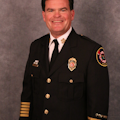As we slowly wind down our Safety, Health and Survival week, there always seems to be the scramble as to what safety challenges to tackle. I sometimes struggle, as I do with fire prevention week, as to how we somehow become more sensitive to the issue by proclaiming a week in its honor when we are actually dealing with a 365 day challenge.
Specifically in this article, I would like to speak to the 13th Life Safety Initiative of the National Fallen Firefighters Foundation's 16 initiatives, which states, “Firefighters and their families must have access to counseling and psychological support.”
Before I climb on my soapbox, let me provide an example that I use consistently when I speak on this topic and see if you can relate. In any firehouse in these great United States or around the world for that matter, if a firefighter complained of chest pains for a second time, whether that be their next duty day or their next drill night, they would be challenged to seek medical attention immediately or their spouse would be called! The true care for a fellow firefighter is evident.
Now let's use the same scenario, but let's change it to a firefighter who is normally very outgoing and engaged. This firefighter now becomes withdrawn, agitated, disheveled in appearance or apathetic. The behavior continues for countless times. Do you think that firefighter will have anyone go up to him or her and ask them if they need any help? I am here to tell you that the answer to that is most often no.
Mental health challenges are just as much of a threat to firefighter safety as building construction, reduced staffing, response times and physical health. Yet for some reason our approach to this issue goes silent.
In February 2009, I had an article published entitled “A Father's Grief.” It was probably the most difficult thing I have ever written in my life. The article briefly outlined my struggles as a fire chief to deal with the loss of my 20-year-old son Sean who took his life after 15 years of dealing with deep depression. Since that article was published, and with the encouragement of many wonderful people in the fire service, I have gone out to give talks on how poorly I handled the entire situation.
I had an opportunity to show all in my department that mental illness is no different than a back injury. Both are things no one would choose to be afflicted by and can cause day-to-day hardships over the most simplest of things. Yet how they are viewed in today's society is in direct contradiction. One is very acceptable while the other can cause shame.
I thought if my department knew of Sean’s condition, how could they possibly understand the whole mental illness concept and its ramifications when my wife and I were living in that environment every day and we felt lost? I knew my fellow chiefs had their own crosses to bear so why add to their plate?
That decision, in hindsight, was a huge mistake. The toll it took on me to try and keep up this “super” façade and the pressure it put on my few confidants, no matter how well intentioned, was a huge error in judgment.
The unsolicited feedback I have received from my talks is very clear. Sean's situation is not unique. The mental health challenge may impact a family member in your department, a firefighter or you! Many in the fire service struggle with the contradiction of needing to be superhuman one moment during a crisis situation and then in the next moment, return to you “Clark Kent” persona as a husband, mother, spouse, etc.
You need to be aware that the challenges related to mental health are on the increase. With the downswing in the economy, the loss of jobs, the stress of paying bills, all our people are affected. What I am asking you to do during this week and then for the rest of the year is to examine in your department what education you provide on this subject and what support is out there for not only department members but for their families too.
Do you have access to counselors who are familiar with the fire service culture? If you are fortunate enough to have an employee assistance program do you know who they are and what exact services they provide? Do you role model the fact that if someone must face mental health challenges personally or in their family that your organization will be there to help?
Many I have spoken to do not have the answers to these basic questions. The safety threat is just as real as standing underneath that wall that is about to collapse on your crews and you. The only difference is you can't see this wall. So do something about it now! Sean and I both appreciate the effort.
PATRICK J. KENNY has spent 28 years with the fire service. He has articles published regarding leadership, safety and fire codes. He holds a bachelors degree in psychology, associates degree in fire science and is an executive fire officer graduate and CFO. You can contact Patrick by e-mail at: [email protected]
About the Author

Patrick J. Kenny
Patrick J. Kenny has been a member of the fire service for over 32 years, currently serving as the fire chief in Western Springs, Ill. Chief Kenny serves as a member of the Illinois Fire Chiefs Promotional Assessment Board and is a past president of the Illinois Fire Chief's Association.